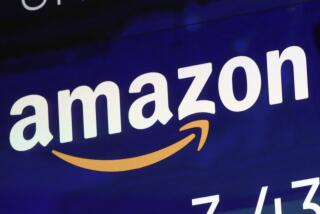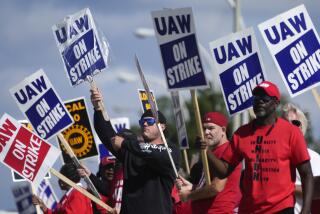Buyback Surge Is Stoking Debate
- Share via
With corporate America’s appetite for its own stock at record levels, some investors are recommending a change of diet.
More than half the companies in the blue-chip Standard & Poor’s 500 index shrank their shares outstanding in the second quarter as they plowed cash into stock buybacks, S&P; data show.
But Wall Street, which long has cheered buybacks as good for shareholders, is having second thoughts. Increasingly, big investors are saying companies should be using more of their profit to reinvest in their businesses -- and in the economy -- and less to retire shares, according to a Merrill Lynch & Co. survey released Tuesday.
Buybacks have been popular with many companies for years, but never at the levels of the last 12 months. U.S. firms in the first half announced plans to buy $126 billion of their own shares, 76% more than the repurchase commitment made in the same period of 2004, said data firm Thomson Financial.
Thanks to the buying spree, the number of shares outstanding declined at 54% of the S&P; 500 companies in the second quarter, compared with the 36% of firms that cut their share count in the first quarter, said Howard Silverblatt, a market analyst at Standard & Poor’s.
Fans of share buybacks say they can be the smartest use of corporate capital. By buying shares in the open market a company can help support its stock price. What’s more, if a company shrinks its share count, future earnings will be spread over a smaller number of shares -- raising per-share profit and boosting the ownership stakes of remaining shareholders.
On Tuesday, financial services giant Wachovia Corp. was the latest to announce a major new buyback program. The Charlotte, N.C.-based bank said its board voted to raise the company’s dividend 11% and also authorized repurchasing 100 million shares. Combined with a previous 50-million-share authorization, the company could retire more than 9% of its outstanding shares if it buys back the full amount.
Wachovia stock inched up 14 cents to $50.33 on an otherwise down day on Wall Street.
Buybacks are “a great way to elevate earnings per share, unless there’s something better to do with the money,” said William Hummer, a principal at money manager Wayne Hummer Investments in Chicago.
That’s the growing debate: Would shareholders be better served, in the long run, if companies diverted more of their earnings to capital spending, hiring and other investments in their basic businesses, instead of taking shares off the market?
Merrill Lynch, which each month surveys about 300 money managers worldwide on various investment topics, said Tuesday there had been a shift in big investors’ attitude about the best use of corporate cash.
Asked what they would most like to see companies doing with their cash, 38% of money managers in the August survey preferred that businesses increase their capital spending. That was up from 30% in May.
By contrast, 42% said they would urge firms to use cash for buybacks, dividend increases or acquisitions. That number has fallen from 49% in May.
“Investors are increasingly polarized between those who want to see cash returned to shareholders [through buybacks and dividend hikes] and those who want to see it injected back into businesses,” said David Bowers, Merrill’s chief global investment strategist.
Billionaire investor Carl Icahn is in the buyback camp. This week, he began pressuring Time Warner Inc. to purchase $20 billion worth of its stock to help lift the share price.
Conversely, the case for greater business capital spending is that it could “lay the foundation for a more enduring economic recovery,” Bowers said.
Consumer spending has largely powered the economy since 2000, but some analysts believe businesses should be leading the way now, investing in new plants and equipment and adding more jobs. That in itself would be a vote of confidence in the economy, their argument goes, and could help the struggling stock market as well.
The S&P; 500 index is up just 0.6% year to date -- despite the record level of buybacks.
Although buybacks can help support share values, they’re no guarantee of higher prices in the short term. Computer networking gear leader Cisco Systems Inc. has reduced its share count by 2.6% this year, but its stock price still is down 8.8%.
Bill Strazzullo, chief trading strategist at State Street Global Markets in Boston, said heavy business spending on buybacks may have the unintended effect of making some investors reluctant to buy stocks by presenting a dim view of growth prospects.
“They’re thinking, ‘If things were so great in the economy, why aren’t companies hiring more people and using cash for capital expenditures instead of buybacks?’ ” he said.
Many corporate chiefs, however, aren’t likely to see the need for significant expansion programs, said Stephen Biggar, director of U.S. equity research at Standard & Poor’s in New York.
Although the economy has grown briskly for the last 18 months, U.S. industry was using 79.7% of capacity in July, down from 79.8% in June and up modestly from 78.3% a year ago, the Federal Reserve said Tuesday.
Given the amount of unused industrial capacity in this country, and competition that has burgeoned overseas over the last decade, few U.S. companies could justify spending to sharply boost production, Biggar said.
“There’s no real shortage of anything worldwide -- except for oil,” he said.
David Heuther, economist at the National Assn. of Manufacturers in Washington, said that although companies might not be rushing to build new production capacity, many are spending on updated equipment and software to boost efficiency.
Government data show that spending on equipment and software rose at an 8% annualized rate in the first quarter and 11% in the second. Heuther predicted the pace would continue at a rate of 9% to 10% in the second half.
Of the manufacturing association’s membership, Heuther said, “I think their outlook on the economy is pretty positive,” which he said should support higher reinvestment levels in the businesses.
Some companies say their profit growth has been strong enough to justify higher capital spending as well as greater share repurchases.
Energy titan Exxon Mobil Corp., for example, said capital spending totaled $4.5 billion in the second quarter, up 25% from a year earlier. The company also said it spent $3.7 billion on stock buybacks in the latest quarter.
*
(BEGIN TEXT OF INFOBOX)
Shrinking shares outstanding
Many large U.S. companies have reduced their shares outstanding this year, but that’s no guarantee of a higher stock price, at least in the short term
Shares outstanding, in millions, as of:
*--* YTD stock Company Dec. 31 March 31 June 30 price chng. Exxon Mobil 6,401.0 6,366.0 6,305.0 +15.2% Knight Ridder 77.7 76.3 74.5 -2.1 Kimberly-Clark 482.9 478.9 476.6 -4.0 Cisco Systems* 6,652.0 6,541.0 6,480.0 -8.8 Wal-Mart Stores* 4,242.0 4,234.0 4,180.0 -9.9 Anheuser-Busch 795.0 785.9 782.4 -12.8 Harley-Davidson 295.4 294.2 281.2 -16.3 Westwood One 95.7 94.3 92.2 -23.1
*--*
*Data are for periods ending in January, April and July.
Sources: Company financial statements, Times research
More to Read
Inside the business of entertainment
The Wide Shot brings you news, analysis and insights on everything from streaming wars to production — and what it all means for the future.
You may occasionally receive promotional content from the Los Angeles Times.










